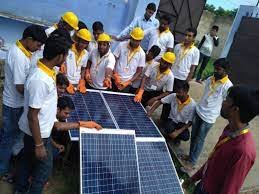
In an era of heightened environmental consciousness and burgeoning renewable energy technologies, the role of a Solar Panel Installation Technician emerges as a pivotal component in the transition towards sustainable energy practices. As the world grapples with the consequences of climate change and seeks alternatives to fossil fuels, solar energy stands out as a beacon of hope, offering clean and abundant power. Behind the scenes of this renewable energy revolution are the skilled professionals known as Solar Panel Installation Technicians, who play a crucial role in bringing solar power to homes, businesses, and communities worldwide.
Understanding the Role
Solar Panel Installation Technicians, also referred to as solar photovoltaic (PV) installers, are responsible for assembling, installing, and maintaining solar panel systems on rooftops or other structures. These systems, comprising solar panels, inverters, mounting hardware, and wiring, capture sunlight and convert it into electricity, thereby reducing dependence on non-renewable energy sources and lowering carbon emissions.
The duties of a Solar Panel Installation Technician encompass a diverse range of tasks, including:
- Site Assessment: Before installation begins, technicians evaluate the site to determine its suitability for solar panels. Factors such as roof orientation, shading, and structural integrity are considered to optimize the system’s performance.
- Installation Planning: Based on the site assessment, technicians devise a detailed installation plan, including the placement of panels, wiring routes, and necessary equipment. Attention to safety protocols and building codes is paramount throughout the planning process.
- Panel Installation: Using specialized tools and equipment, technicians mount solar panels onto rooftops or other designated areas. Precision and accuracy are crucial to ensure optimal sunlight exposure and system efficiency.
- Electrical Wiring: Technicians connect the solar panels to inverters and electrical systems, ensuring seamless integration with the existing power infrastructure. This involves routing and securing electrical wiring, as well as implementing safety measures to prevent electrical hazards.
- Testing and Commissioning: Once the installation is complete, technicians conduct rigorous testing to verify the functionality and performance of the solar panel system. Any issues or discrepancies are promptly addressed to ensure optimal operation.
- Maintenance and Repair: Solar Panel Installation Technicians also provide ongoing maintenance services, such as cleaning panels, inspecting components for wear and tear, and troubleshooting system malfunctions. In the event of damage or malfunction, technicians are adept at identifying and rectifying issues to restore system functionality.
Skillset and Qualifications
Becoming a proficient Solar Panel Installation Technician requires a combination of technical expertise, practical skills, and industry-specific knowledge. While formal education is not always mandatory, most technicians undergo specialized training programs or apprenticeships to acquire the necessary competencies. Key skills and qualifications include:
- Technical Aptitude: A solid understanding of electrical systems, construction principles, and mechanical concepts is essential for successful solar panel installations. Technicians must be capable of interpreting technical diagrams, performing calculations, and troubleshooting equipment.
- Safety Compliance: Given the inherent risks associated with working at heights and handling electrical components, adherence to safety protocols is paramount. Technicians must possess knowledge of Occupational Safety and Health Administration (OSHA) regulations and undergo safety training to mitigate workplace hazards.
- Manual Dexterity: The installation of solar panels often entails physical labor, including lifting, climbing, and maneuvering in tight spaces. Technicians should have good physical fitness and manual dexterity to navigate installation sites and manipulate equipment effectively.
- Problem-Solving Skills: Solar panel installations can present unforeseen challenges or complications that require quick thinking and effective problem-solving. Technicians must be adaptable and resourceful in addressing issues to ensure project success.
- Certification: Many employers prefer or require certification from reputable organizations such as the North American Board of Certified Energy Practitioners (NABCEP). Certification demonstrates a technician’s proficiency and commitment to industry standards and best practices.
Career Outlook and Opportunities
The demand for Solar Panel Installation Technicians is on the rise, driven by increasing adoption of solar energy and government incentives to promote renewable energy development. According to the U.S. Bureau of Labor Statistics, employment of solar photovoltaic installers is projected to grow much faster than the average for all occupations, with a 51% increase from 2020 to 2030.
As solar technology continues to evolve and become more affordable, opportunities for career advancement and specialization within the field are also expanding. Experienced technicians may transition into roles such as solar project managers, system designers, or technical trainers, leveraging their expertise to oversee larger projects or mentor aspiring professionals.
Moreover, the global shift towards renewable energy presents opportunities for Solar Panel Installation Technicians beyond traditional markets. Developing countries and remote communities with limited access to electricity are increasingly turning to solar power as a cost-effective and sustainable energy solution, creating demand for skilled technicians worldwide.

Conclusion
In the quest for a greener and more sustainable future, Solar Panel Installation Technicians occupy a critical niche, facilitating the widespread adoption of solar energy systems across diverse settings. Their expertise and dedication enable individuals, businesses, and communities to harness the power of the sun, reducing carbon emissions, and mitigating the impacts of climate change. As the renewable energy landscape continues to evolve, the role of Solar Panel Installation Technicians remains indispensable in shaping a cleaner, brighter tomorrow.
